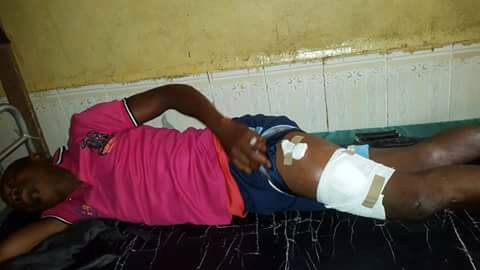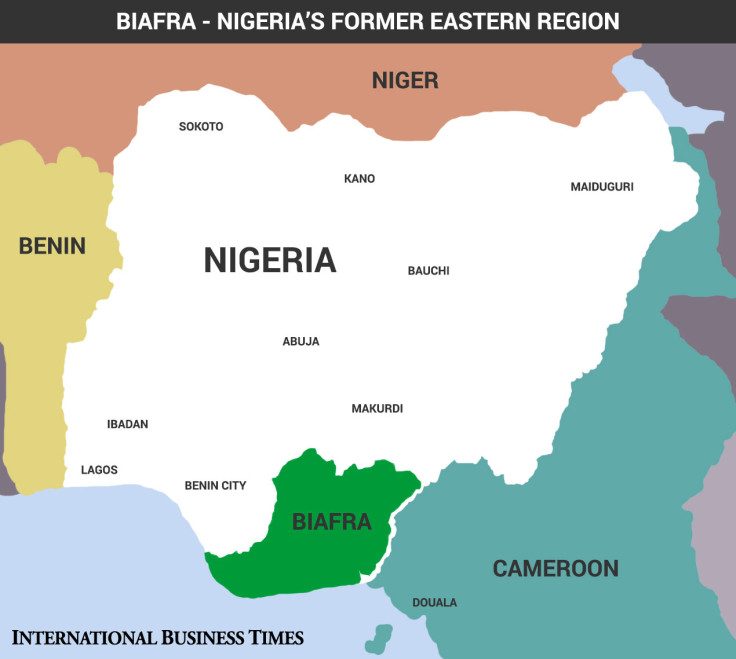Nigeria: Police deny pro-Biafrans killed in Onitsha

The Nigerian police have refuted allegations that pro-Biafran separatists were shot dead during a protest in Onitsha, Anambra state, Nigeria on 30 August. The Indigenous People of Biafra (Ipob) group − which calls for the independence of the territories that constituted the Biafran Republic, established in 1967 and reannexed to Nigeria in 1970 − alleged that at least two members were killed and nine wounded when Anambra's police and navy started shooting during what they said was a "peaceful manifestation".
However, Anambra State commissioner of police, Mr Hassan Karma, said reports of the killings were incorrect and that police and navy shot to disperse people after being provoked by the pro-Biafrans. He told IBTimes UK: "Nobody died, nobody was killed. I expect them to take the corpses at the police station as I speak to you now. Where are the dead bodies? Nobody has seen them."

Karma alleged that pro-Biafrans − whom he deemed "criminals on the street, rather than protesters" − injured a member of the navy. He also alleged that the people who were marching were members of the Movement for the Actualisation of the Sovereign State of Biafra (Massob), which the Nigerian government accused of violence.
During a conversation with IBTimes UK, Ikechukwu Okoye, Ipob coordinator for the Anambra state, denied that a member of the navy was injured and accused the police and navy of excessive violence against what he reiterated were members of Ipob, not Massob. He explained that on 30 August, around 5,000 Ipob members decided to go on an "evangelism march" on the streets to hand out flyers and "educate people on Biafra".
What is the Republic of Biafra?

Nigeria's former Eastern Region was proclaimed the Republic of Biafra in 1967. It was re-annexed to Nigeria three years later, following a civil war that claimed between one and three million lives.
The fact that Nigeria's oil was located in the south of the country played a major role in the eruption of the war, during which medicines and food shortages in Biafra led to the deaths of thousands of people.
Biafra has been commonly divided into four main "tribes": the Ibos, the Ibibio-Efiks, the Ijaws and the Ogojas.
The modern-day states that made up Biafra from the eastern region and midwest are: Abia, Anambra, Akwa Ibom, Bayelsa, Enugu, Ebonyi, Imo, Delta, Rivers and Cross River and Edo.
Pro-Biafrans believe the modern-day Nigerian states that made up Biafra should be part of an independent state as people who inhabit these areas, and identify themselves as southerners, feel disenfranchised from those in the north.
He alleged that while the demonstrators were heading to River Niger Bridge Head in Onitsha, they encountered members of the police and navy who shot two people dead and injured several others. IBT spoke on the phone with seven Ipob members, including Okoye, who were allegedly injured during the march. They all said they were shot in the legs "for no reason" by the police and the army and were taken to the Toronto Hospital where they received treatment.
During the interviews, the pro-Biafrans said they still intended to create an independent state, arguing that "Biafrans have nothing to do with Nigeria".
Okoye sent several videos of the march to IBTimes UK. Although none of them show violence being committed by either side, in one of the videos gun shots can be heard as Ipob members speak with the police. However, it is not clear who fired the shots. Okoye said: "We couldn't possibly take video of it [violence], considering the ferocity of shooting."
The Ananmbra police expressed concern over what it perceives as increasing violence of pro-Biafrans. Earlier in September, dozens of pro-Biafrans were arrested after the inspector general of police, Solomon E Arase, released a statement urging authorities to clamp down on people who behaved violently across the country. The statement read: "This directive becomes imperative owing to recent activities of members of the Massob and the Indigenous People of Biafra [Ipob] in some parts of the country."
Karma told IBT: "Massob and other movements are snatching arms from security agencies. They are preparing to do something that tomorrow will become an international embarrassment for Nigeria and we say no to it. Criminals are criminals anyway, under whatever name they call themselves."
He added: "It is people taking laws into their hands and it's the same situation that generated Boko Haram today in the northeast. People started like this, even in Niger Delta, where militants started kidnapping people for extortion."
Ipob denied it has any weapons and alleged the government uses Massob, which has been widely condemned for violent activities, to smear the reputation of all pro-Biafrans.
Intelligence analysis: Dialogue urgently needed
UK-based TGS Intelligence Consultants warned that something has to be done to prevent the situation from further escalating. Referring to the episode of 30 August, TGS's CEO David Otto told IBT: "On one side, you have police saying they shot because pro-Biafrans were armed and then the group saying 'we were not armed'. Most of the times, for you to know whether the group was armed or not, is if that group actually shot one of the policemen. In the case of 30 August, none of the police members was injured.
"We do not have any evidence that they [pro-Biafrans] were armed during the actual protest," he continued. "Some of the members of the group were shot. If protesters did not retaliate, there is a high possibility that they were not armed. However, we know that the Biafran movement has acquired ammunition during the Jonathan's administration and they are working with the Niger Delta militia, who are well-armed.
"We do know that pro-Biafrans are very organised. The Briafran movement is taken very seriously: They are using international media, they are very active in America, the UK, Germany. They have printed Biafran currency and Biafran passports. This organisation is waiting for a trigger to start some kind of revolution."
Otto added that the Nigerian police should not approach pro-Biafran protests in a violent way. He also believes that this is the right time for newly-elected President Buhari to call for dialogue with pro-Biafrans to reach peace and prevent violence.
"This is the point at which the government has to be able to call for discussions, this is very important to understand what is actually going on," he said. Ipob denied that pro-Biafrans are joining forces with Niger Delta militants, deeming the allegation as "a big lie".
© Copyright IBTimes 2025. All rights reserved.






















